MG414 Organisational Behaviour: Analysis of Glencore Plc
VerifiedAdded on 2023/06/15
|11
|3209
|143
Report
AI Summary
This report provides an analysis of Glencore Plc's organisational behaviour, exploring the company's environment through analytical models and focusing on ethical changes, employee involvement, and the impact of motivational theories. It examines how Glencore leverages its culture to enhance effectiveness, discussing communication strategies for problem-solving and internal alignment. The report also delves into Maslow's hierarchy of needs and intrinsic/extrinsic motivators, evaluating their influence on employee engagement within Glencore's specific context, and concludes with insights on improving managerial performance and overall organisational success. Desklib offers similar solved assignments and past papers for students.
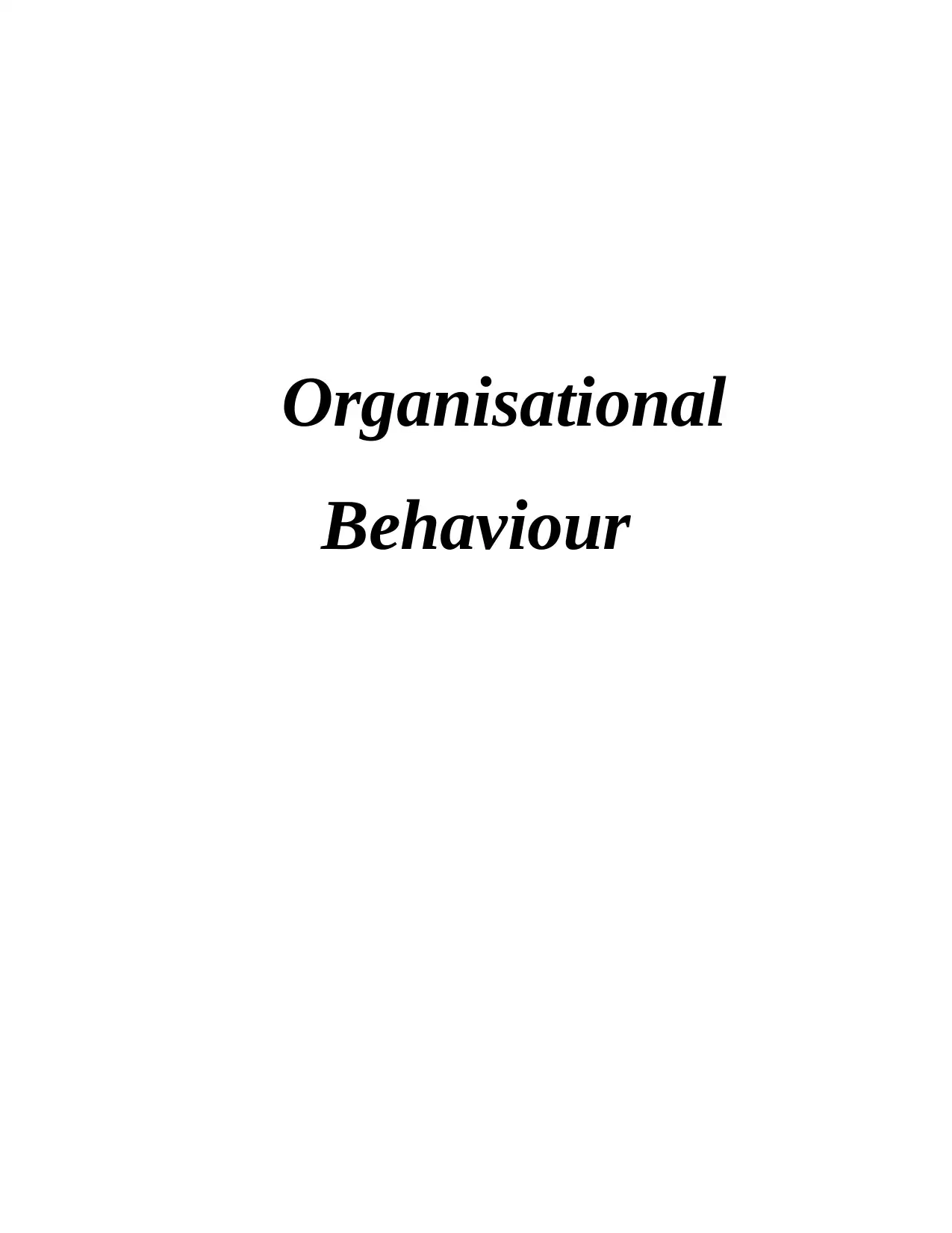
Organisational
Behaviour
Behaviour
Paraphrase This Document
Need a fresh take? Get an instant paraphrase of this document with our AI Paraphraser
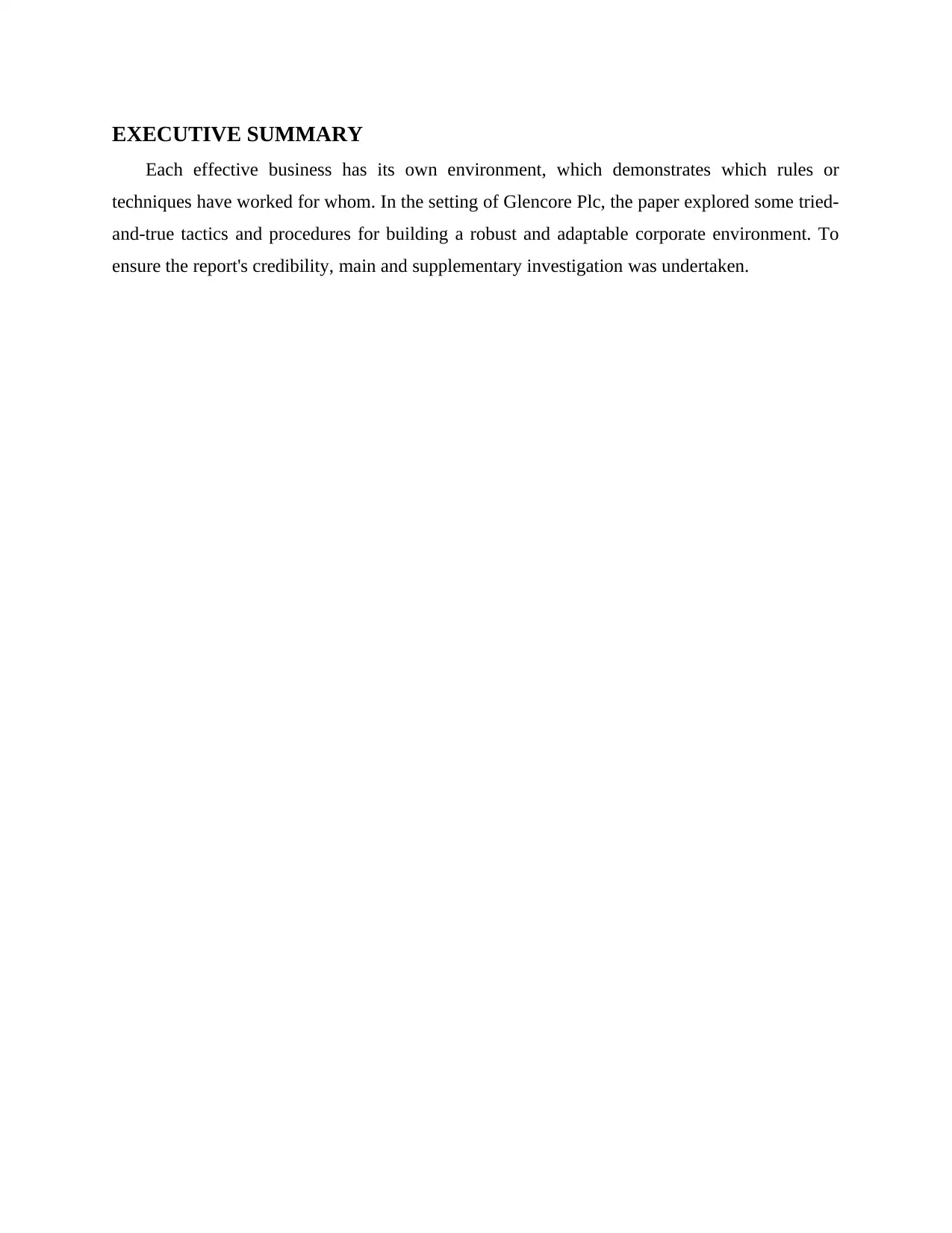
EXECUTIVE SUMMARY
Each effective business has its own environment, which demonstrates which rules or
techniques have worked for whom. In the setting of Glencore Plc, the paper explored some tried-
and-true tactics and procedures for building a robust and adaptable corporate environment. To
ensure the report's credibility, main and supplementary investigation was undertaken.
Each effective business has its own environment, which demonstrates which rules or
techniques have worked for whom. In the setting of Glencore Plc, the paper explored some tried-
and-true tactics and procedures for building a robust and adaptable corporate environment. To
ensure the report's credibility, main and supplementary investigation was undertaken.
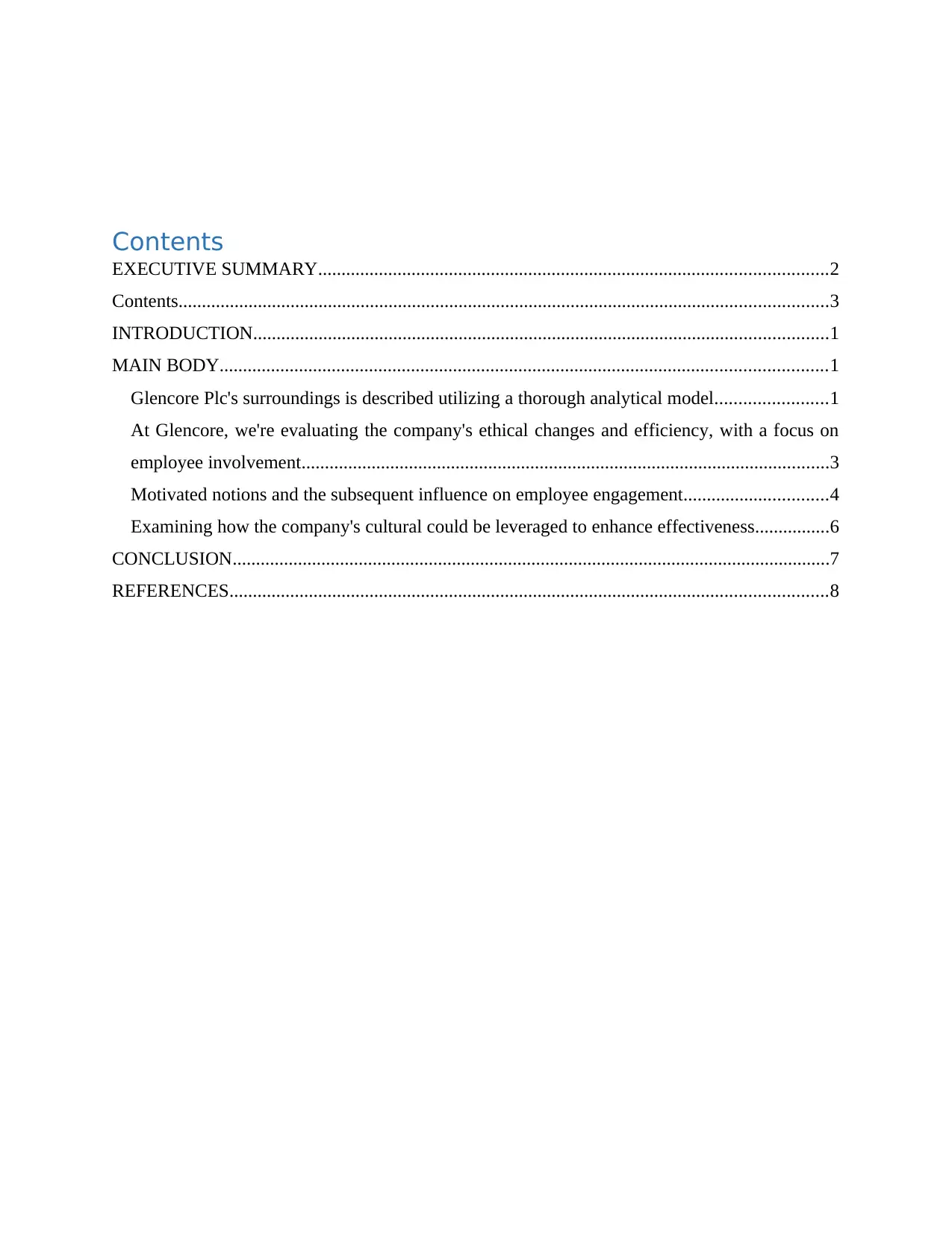
Contents
EXECUTIVE SUMMARY.............................................................................................................2
Contents...........................................................................................................................................3
INTRODUCTION...........................................................................................................................1
MAIN BODY..................................................................................................................................1
Glencore Plc's surroundings is described utilizing a thorough analytical model........................1
At Glencore, we're evaluating the company's ethical changes and efficiency, with a focus on
employee involvement.................................................................................................................3
Motivated notions and the subsequent influence on employee engagement...............................4
Examining how the company's cultural could be leveraged to enhance effectiveness................6
CONCLUSION................................................................................................................................7
REFERENCES................................................................................................................................8
EXECUTIVE SUMMARY.............................................................................................................2
Contents...........................................................................................................................................3
INTRODUCTION...........................................................................................................................1
MAIN BODY..................................................................................................................................1
Glencore Plc's surroundings is described utilizing a thorough analytical model........................1
At Glencore, we're evaluating the company's ethical changes and efficiency, with a focus on
employee involvement.................................................................................................................3
Motivated notions and the subsequent influence on employee engagement...............................4
Examining how the company's cultural could be leveraged to enhance effectiveness................6
CONCLUSION................................................................................................................................7
REFERENCES................................................................................................................................8
⊘ This is a preview!⊘
Do you want full access?
Subscribe today to unlock all pages.

Trusted by 1+ million students worldwide
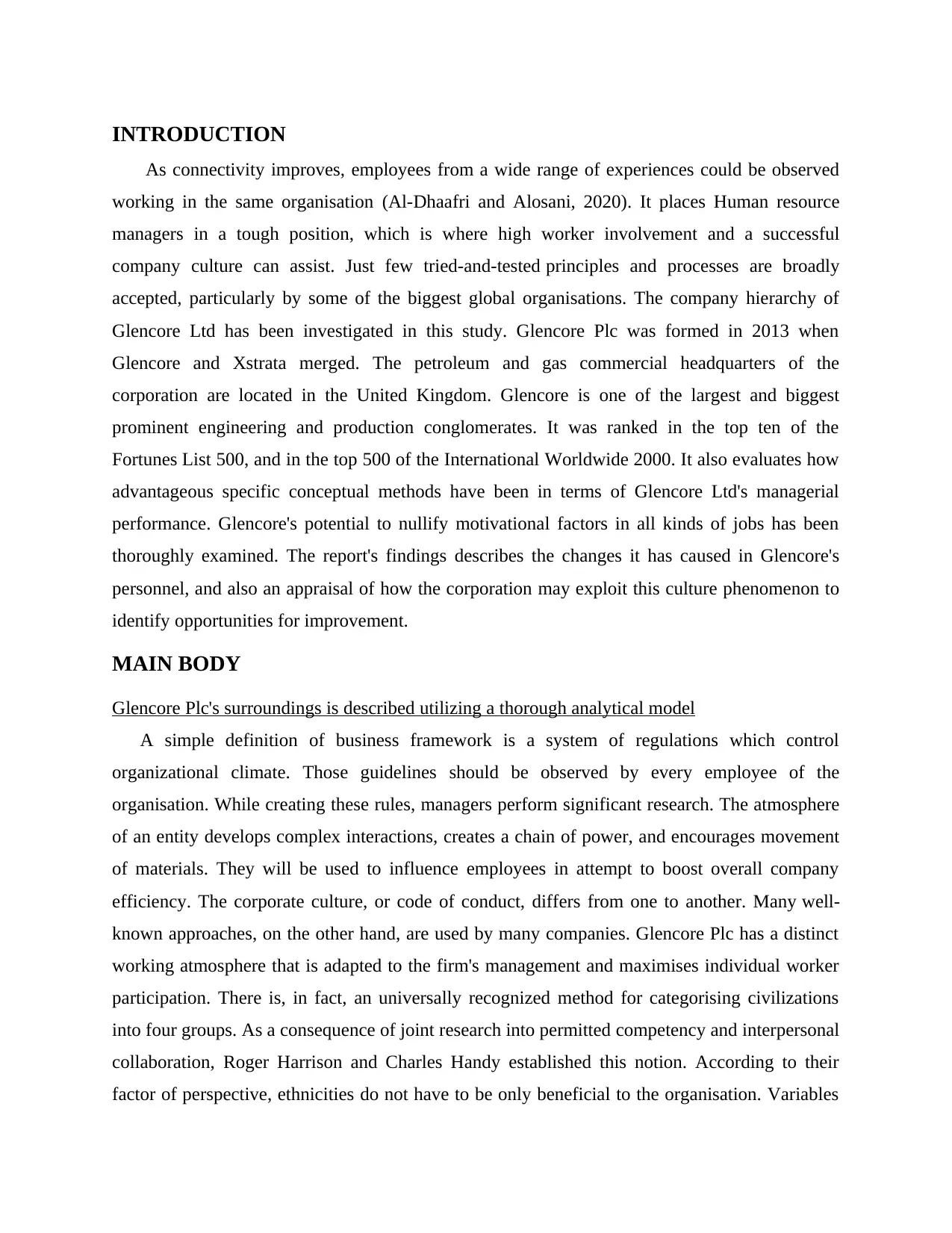
INTRODUCTION
As connectivity improves, employees from a wide range of experiences could be observed
working in the same organisation (Al-Dhaafri and Alosani, 2020). It places Human resource
managers in a tough position, which is where high worker involvement and a successful
company culture can assist. Just few tried-and-tested principles and processes are broadly
accepted, particularly by some of the biggest global organisations. The company hierarchy of
Glencore Ltd has been investigated in this study. Glencore Plc was formed in 2013 when
Glencore and Xstrata merged. The petroleum and gas commercial headquarters of the
corporation are located in the United Kingdom. Glencore is one of the largest and biggest
prominent engineering and production conglomerates. It was ranked in the top ten of the
Fortunes List 500, and in the top 500 of the International Worldwide 2000. It also evaluates how
advantageous specific conceptual methods have been in terms of Glencore Ltd's managerial
performance. Glencore's potential to nullify motivational factors in all kinds of jobs has been
thoroughly examined. The report's findings describes the changes it has caused in Glencore's
personnel, and also an appraisal of how the corporation may exploit this culture phenomenon to
identify opportunities for improvement.
MAIN BODY
Glencore Plc's surroundings is described utilizing a thorough analytical model
A simple definition of business framework is a system of regulations which control
organizational climate. Those guidelines should be observed by every employee of the
organisation. While creating these rules, managers perform significant research. The atmosphere
of an entity develops complex interactions, creates a chain of power, and encourages movement
of materials. They will be used to influence employees in attempt to boost overall company
efficiency. The corporate culture, or code of conduct, differs from one to another. Many well-
known approaches, on the other hand, are used by many companies. Glencore Plc has a distinct
working atmosphere that is adapted to the firm's management and maximises individual worker
participation. There is, in fact, an universally recognized method for categorising civilizations
into four groups. As a consequence of joint research into permitted competency and interpersonal
collaboration, Roger Harrison and Charles Handy established this notion. According to their
factor of perspective, ethnicities do not have to be only beneficial to the organisation. Variables
As connectivity improves, employees from a wide range of experiences could be observed
working in the same organisation (Al-Dhaafri and Alosani, 2020). It places Human resource
managers in a tough position, which is where high worker involvement and a successful
company culture can assist. Just few tried-and-tested principles and processes are broadly
accepted, particularly by some of the biggest global organisations. The company hierarchy of
Glencore Ltd has been investigated in this study. Glencore Plc was formed in 2013 when
Glencore and Xstrata merged. The petroleum and gas commercial headquarters of the
corporation are located in the United Kingdom. Glencore is one of the largest and biggest
prominent engineering and production conglomerates. It was ranked in the top ten of the
Fortunes List 500, and in the top 500 of the International Worldwide 2000. It also evaluates how
advantageous specific conceptual methods have been in terms of Glencore Ltd's managerial
performance. Glencore's potential to nullify motivational factors in all kinds of jobs has been
thoroughly examined. The report's findings describes the changes it has caused in Glencore's
personnel, and also an appraisal of how the corporation may exploit this culture phenomenon to
identify opportunities for improvement.
MAIN BODY
Glencore Plc's surroundings is described utilizing a thorough analytical model
A simple definition of business framework is a system of regulations which control
organizational climate. Those guidelines should be observed by every employee of the
organisation. While creating these rules, managers perform significant research. The atmosphere
of an entity develops complex interactions, creates a chain of power, and encourages movement
of materials. They will be used to influence employees in attempt to boost overall company
efficiency. The corporate culture, or code of conduct, differs from one to another. Many well-
known approaches, on the other hand, are used by many companies. Glencore Plc has a distinct
working atmosphere that is adapted to the firm's management and maximises individual worker
participation. There is, in fact, an universally recognized method for categorising civilizations
into four groups. As a consequence of joint research into permitted competency and interpersonal
collaboration, Roger Harrison and Charles Handy established this notion. According to their
factor of perspective, ethnicities do not have to be only beneficial to the organisation. Variables
Paraphrase This Document
Need a fresh take? Get an instant paraphrase of this document with our AI Paraphraser
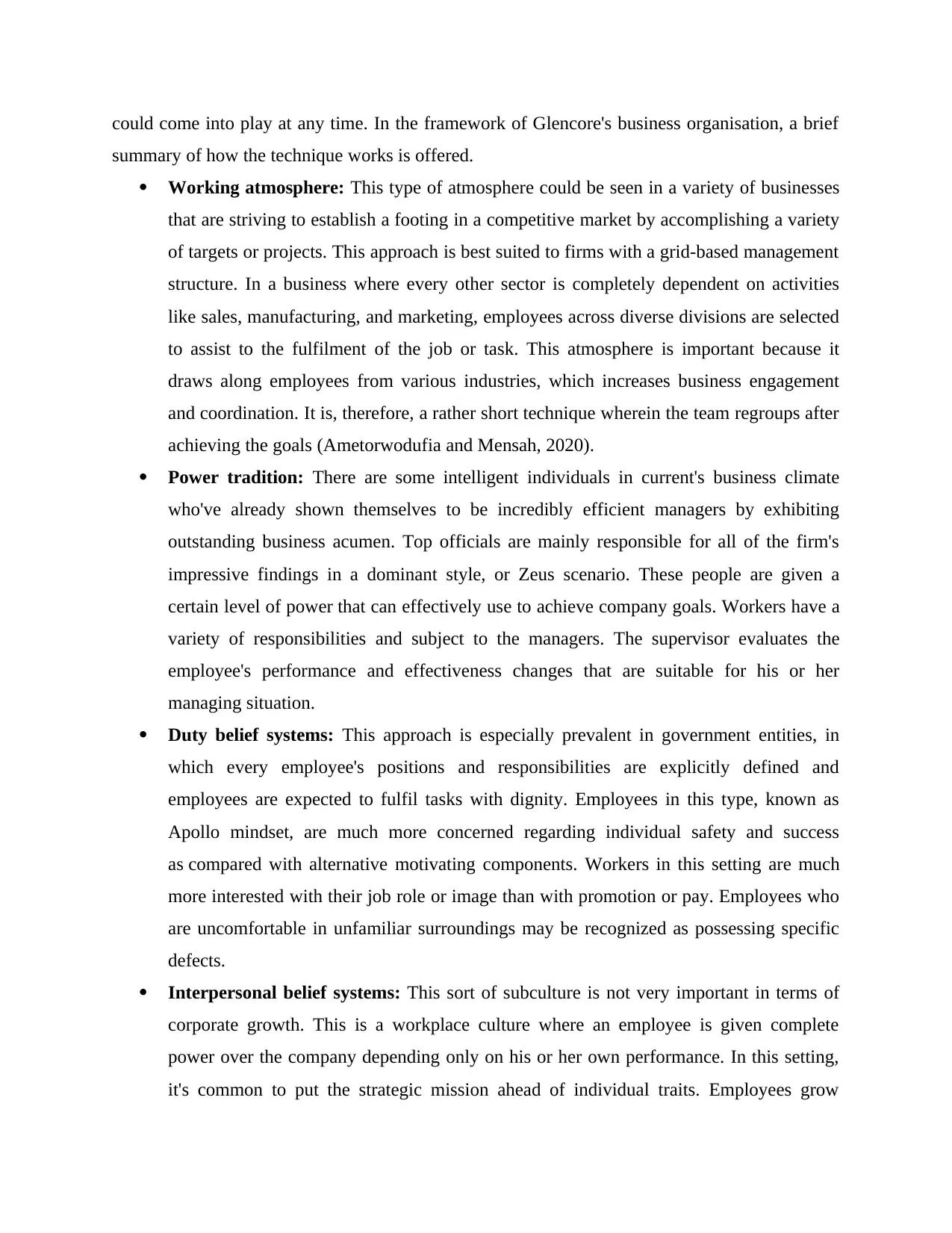
could come into play at any time. In the framework of Glencore's business organisation, a brief
summary of how the technique works is offered.
Working atmosphere: This type of atmosphere could be seen in a variety of businesses
that are striving to establish a footing in a competitive market by accomplishing a variety
of targets or projects. This approach is best suited to firms with a grid-based management
structure. In a business where every other sector is completely dependent on activities
like sales, manufacturing, and marketing, employees across diverse divisions are selected
to assist to the fulfilment of the job or task. This atmosphere is important because it
draws along employees from various industries, which increases business engagement
and coordination. It is, therefore, a rather short technique wherein the team regroups after
achieving the goals (Ametorwodufia and Mensah, 2020).
Power tradition: There are some intelligent individuals in current's business climate
who've already shown themselves to be incredibly efficient managers by exhibiting
outstanding business acumen. Top officials are mainly responsible for all of the firm's
impressive findings in a dominant style, or Zeus scenario. These people are given a
certain level of power that can effectively use to achieve company goals. Workers have a
variety of responsibilities and subject to the managers. The supervisor evaluates the
employee's performance and effectiveness changes that are suitable for his or her
managing situation.
Duty belief systems: This approach is especially prevalent in government entities, in
which every employee's positions and responsibilities are explicitly defined and
employees are expected to fulfil tasks with dignity. Employees in this type, known as
Apollo mindset, are much more concerned regarding individual safety and success
as compared with alternative motivating components. Workers in this setting are much
more interested with their job role or image than with promotion or pay. Employees who
are uncomfortable in unfamiliar surroundings may be recognized as possessing specific
defects.
Interpersonal belief systems: This sort of subculture is not very important in terms of
corporate growth. This is a workplace culture where an employee is given complete
power over the company depending only on his or her own performance. In this setting,
it's common to put the strategic mission ahead of individual traits. Employees grow
summary of how the technique works is offered.
Working atmosphere: This type of atmosphere could be seen in a variety of businesses
that are striving to establish a footing in a competitive market by accomplishing a variety
of targets or projects. This approach is best suited to firms with a grid-based management
structure. In a business where every other sector is completely dependent on activities
like sales, manufacturing, and marketing, employees across diverse divisions are selected
to assist to the fulfilment of the job or task. This atmosphere is important because it
draws along employees from various industries, which increases business engagement
and coordination. It is, therefore, a rather short technique wherein the team regroups after
achieving the goals (Ametorwodufia and Mensah, 2020).
Power tradition: There are some intelligent individuals in current's business climate
who've already shown themselves to be incredibly efficient managers by exhibiting
outstanding business acumen. Top officials are mainly responsible for all of the firm's
impressive findings in a dominant style, or Zeus scenario. These people are given a
certain level of power that can effectively use to achieve company goals. Workers have a
variety of responsibilities and subject to the managers. The supervisor evaluates the
employee's performance and effectiveness changes that are suitable for his or her
managing situation.
Duty belief systems: This approach is especially prevalent in government entities, in
which every employee's positions and responsibilities are explicitly defined and
employees are expected to fulfil tasks with dignity. Employees in this type, known as
Apollo mindset, are much more concerned regarding individual safety and success
as compared with alternative motivating components. Workers in this setting are much
more interested with their job role or image than with promotion or pay. Employees who
are uncomfortable in unfamiliar surroundings may be recognized as possessing specific
defects.
Interpersonal belief systems: This sort of subculture is not very important in terms of
corporate growth. This is a workplace culture where an employee is given complete
power over the company depending only on his or her own performance. In this setting,
it's common to put the strategic mission ahead of individual traits. Employees grow
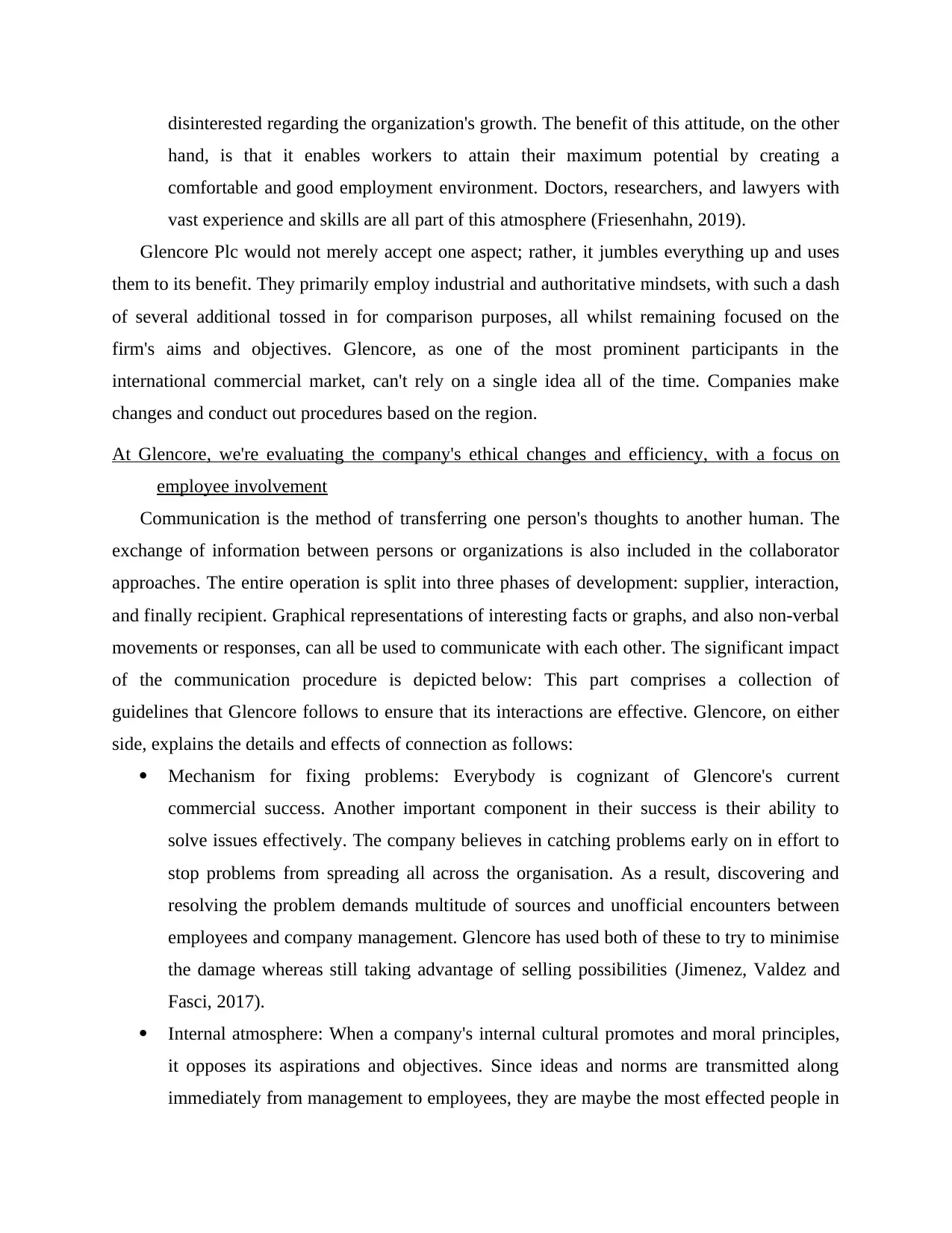
disinterested regarding the organization's growth. The benefit of this attitude, on the other
hand, is that it enables workers to attain their maximum potential by creating a
comfortable and good employment environment. Doctors, researchers, and lawyers with
vast experience and skills are all part of this atmosphere (Friesenhahn, 2019).
Glencore Plc would not merely accept one aspect; rather, it jumbles everything up and uses
them to its benefit. They primarily employ industrial and authoritative mindsets, with such a dash
of several additional tossed in for comparison purposes, all whilst remaining focused on the
firm's aims and objectives. Glencore, as one of the most prominent participants in the
international commercial market, can't rely on a single idea all of the time. Companies make
changes and conduct out procedures based on the region.
At Glencore, we're evaluating the company's ethical changes and efficiency, with a focus on
employee involvement
Communication is the method of transferring one person's thoughts to another human. The
exchange of information between persons or organizations is also included in the collaborator
approaches. The entire operation is split into three phases of development: supplier, interaction,
and finally recipient. Graphical representations of interesting facts or graphs, and also non-verbal
movements or responses, can all be used to communicate with each other. The significant impact
of the communication procedure is depicted below: This part comprises a collection of
guidelines that Glencore follows to ensure that its interactions are effective. Glencore, on either
side, explains the details and effects of connection as follows:
Mechanism for fixing problems: Everybody is cognizant of Glencore's current
commercial success. Another important component in their success is their ability to
solve issues effectively. The company believes in catching problems early on in effort to
stop problems from spreading all across the organisation. As a result, discovering and
resolving the problem demands multitude of sources and unofficial encounters between
employees and company management. Glencore has used both of these to try to minimise
the damage whereas still taking advantage of selling possibilities (Jimenez, Valdez and
Fasci, 2017).
Internal atmosphere: When a company's internal cultural promotes and moral principles,
it opposes its aspirations and objectives. Since ideas and norms are transmitted along
immediately from management to employees, they are maybe the most effected people in
hand, is that it enables workers to attain their maximum potential by creating a
comfortable and good employment environment. Doctors, researchers, and lawyers with
vast experience and skills are all part of this atmosphere (Friesenhahn, 2019).
Glencore Plc would not merely accept one aspect; rather, it jumbles everything up and uses
them to its benefit. They primarily employ industrial and authoritative mindsets, with such a dash
of several additional tossed in for comparison purposes, all whilst remaining focused on the
firm's aims and objectives. Glencore, as one of the most prominent participants in the
international commercial market, can't rely on a single idea all of the time. Companies make
changes and conduct out procedures based on the region.
At Glencore, we're evaluating the company's ethical changes and efficiency, with a focus on
employee involvement
Communication is the method of transferring one person's thoughts to another human. The
exchange of information between persons or organizations is also included in the collaborator
approaches. The entire operation is split into three phases of development: supplier, interaction,
and finally recipient. Graphical representations of interesting facts or graphs, and also non-verbal
movements or responses, can all be used to communicate with each other. The significant impact
of the communication procedure is depicted below: This part comprises a collection of
guidelines that Glencore follows to ensure that its interactions are effective. Glencore, on either
side, explains the details and effects of connection as follows:
Mechanism for fixing problems: Everybody is cognizant of Glencore's current
commercial success. Another important component in their success is their ability to
solve issues effectively. The company believes in catching problems early on in effort to
stop problems from spreading all across the organisation. As a result, discovering and
resolving the problem demands multitude of sources and unofficial encounters between
employees and company management. Glencore has used both of these to try to minimise
the damage whereas still taking advantage of selling possibilities (Jimenez, Valdez and
Fasci, 2017).
Internal atmosphere: When a company's internal cultural promotes and moral principles,
it opposes its aspirations and objectives. Since ideas and norms are transmitted along
immediately from management to employees, they are maybe the most effected people in
⊘ This is a preview!⊘
Do you want full access?
Subscribe today to unlock all pages.

Trusted by 1+ million students worldwide
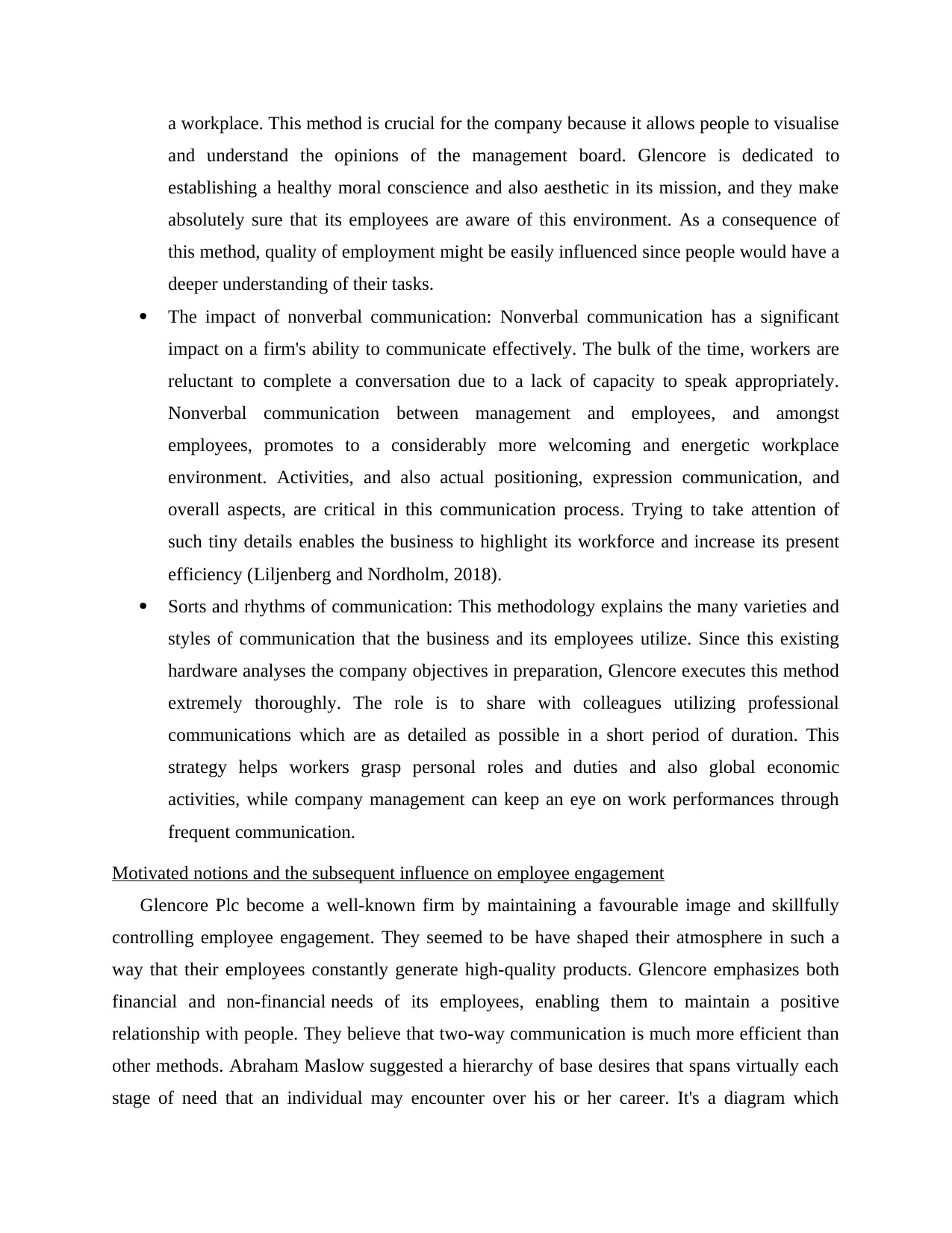
a workplace. This method is crucial for the company because it allows people to visualise
and understand the opinions of the management board. Glencore is dedicated to
establishing a healthy moral conscience and also aesthetic in its mission, and they make
absolutely sure that its employees are aware of this environment. As a consequence of
this method, quality of employment might be easily influenced since people would have a
deeper understanding of their tasks.
The impact of nonverbal communication: Nonverbal communication has a significant
impact on a firm's ability to communicate effectively. The bulk of the time, workers are
reluctant to complete a conversation due to a lack of capacity to speak appropriately.
Nonverbal communication between management and employees, and amongst
employees, promotes to a considerably more welcoming and energetic workplace
environment. Activities, and also actual positioning, expression communication, and
overall aspects, are critical in this communication process. Trying to take attention of
such tiny details enables the business to highlight its workforce and increase its present
efficiency (Liljenberg and Nordholm, 2018).
Sorts and rhythms of communication: This methodology explains the many varieties and
styles of communication that the business and its employees utilize. Since this existing
hardware analyses the company objectives in preparation, Glencore executes this method
extremely thoroughly. The role is to share with colleagues utilizing professional
communications which are as detailed as possible in a short period of duration. This
strategy helps workers grasp personal roles and duties and also global economic
activities, while company management can keep an eye on work performances through
frequent communication.
Motivated notions and the subsequent influence on employee engagement
Glencore Plc become a well-known firm by maintaining a favourable image and skillfully
controlling employee engagement. They seemed to be have shaped their atmosphere in such a
way that their employees constantly generate high-quality products. Glencore emphasizes both
financial and non-financial needs of its employees, enabling them to maintain a positive
relationship with people. They believe that two-way communication is much more efficient than
other methods. Abraham Maslow suggested a hierarchy of base desires that spans virtually each
stage of need that an individual may encounter over his or her career. It's a diagram which
and understand the opinions of the management board. Glencore is dedicated to
establishing a healthy moral conscience and also aesthetic in its mission, and they make
absolutely sure that its employees are aware of this environment. As a consequence of
this method, quality of employment might be easily influenced since people would have a
deeper understanding of their tasks.
The impact of nonverbal communication: Nonverbal communication has a significant
impact on a firm's ability to communicate effectively. The bulk of the time, workers are
reluctant to complete a conversation due to a lack of capacity to speak appropriately.
Nonverbal communication between management and employees, and amongst
employees, promotes to a considerably more welcoming and energetic workplace
environment. Activities, and also actual positioning, expression communication, and
overall aspects, are critical in this communication process. Trying to take attention of
such tiny details enables the business to highlight its workforce and increase its present
efficiency (Liljenberg and Nordholm, 2018).
Sorts and rhythms of communication: This methodology explains the many varieties and
styles of communication that the business and its employees utilize. Since this existing
hardware analyses the company objectives in preparation, Glencore executes this method
extremely thoroughly. The role is to share with colleagues utilizing professional
communications which are as detailed as possible in a short period of duration. This
strategy helps workers grasp personal roles and duties and also global economic
activities, while company management can keep an eye on work performances through
frequent communication.
Motivated notions and the subsequent influence on employee engagement
Glencore Plc become a well-known firm by maintaining a favourable image and skillfully
controlling employee engagement. They seemed to be have shaped their atmosphere in such a
way that their employees constantly generate high-quality products. Glencore emphasizes both
financial and non-financial needs of its employees, enabling them to maintain a positive
relationship with people. They believe that two-way communication is much more efficient than
other methods. Abraham Maslow suggested a hierarchy of base desires that spans virtually each
stage of need that an individual may encounter over his or her career. It's a diagram which
Paraphrase This Document
Need a fresh take? Get an instant paraphrase of this document with our AI Paraphraser
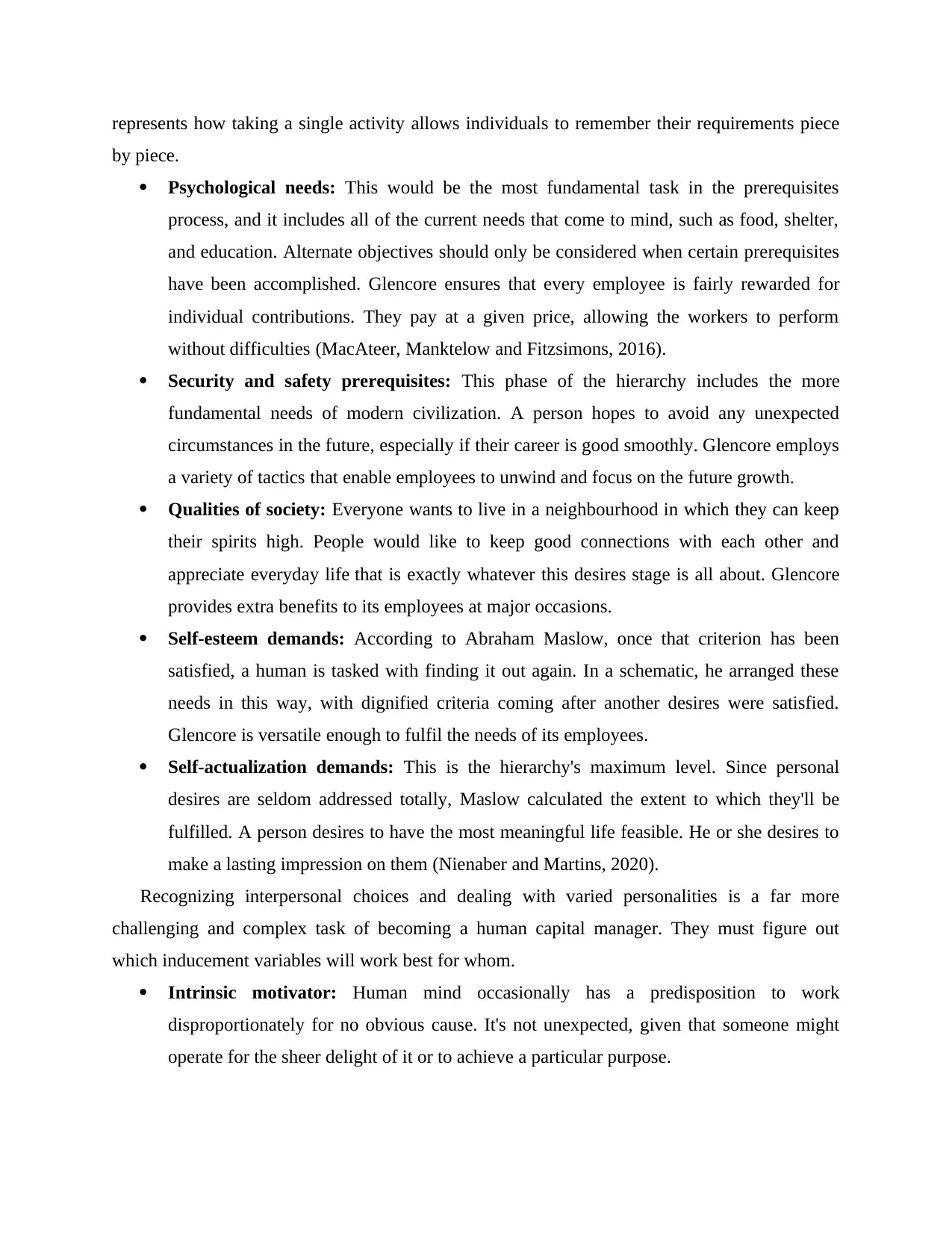
represents how taking a single activity allows individuals to remember their requirements piece
by piece.
Psychological needs: This would be the most fundamental task in the prerequisites
process, and it includes all of the current needs that come to mind, such as food, shelter,
and education. Alternate objectives should only be considered when certain prerequisites
have been accomplished. Glencore ensures that every employee is fairly rewarded for
individual contributions. They pay at a given price, allowing the workers to perform
without difficulties (MacAteer, Manktelow and Fitzsimons, 2016).
Security and safety prerequisites: This phase of the hierarchy includes the more
fundamental needs of modern civilization. A person hopes to avoid any unexpected
circumstances in the future, especially if their career is good smoothly. Glencore employs
a variety of tactics that enable employees to unwind and focus on the future growth.
Qualities of society: Everyone wants to live in a neighbourhood in which they can keep
their spirits high. People would like to keep good connections with each other and
appreciate everyday life that is exactly whatever this desires stage is all about. Glencore
provides extra benefits to its employees at major occasions.
Self-esteem demands: According to Abraham Maslow, once that criterion has been
satisfied, a human is tasked with finding it out again. In a schematic, he arranged these
needs in this way, with dignified criteria coming after another desires were satisfied.
Glencore is versatile enough to fulfil the needs of its employees.
Self-actualization demands: This is the hierarchy's maximum level. Since personal
desires are seldom addressed totally, Maslow calculated the extent to which they'll be
fulfilled. A person desires to have the most meaningful life feasible. He or she desires to
make a lasting impression on them (Nienaber and Martins, 2020).
Recognizing interpersonal choices and dealing with varied personalities is a far more
challenging and complex task of becoming a human capital manager. They must figure out
which inducement variables will work best for whom.
Intrinsic motivator: Human mind occasionally has a predisposition to work
disproportionately for no obvious cause. It's not unexpected, given that someone might
operate for the sheer delight of it or to achieve a particular purpose.
by piece.
Psychological needs: This would be the most fundamental task in the prerequisites
process, and it includes all of the current needs that come to mind, such as food, shelter,
and education. Alternate objectives should only be considered when certain prerequisites
have been accomplished. Glencore ensures that every employee is fairly rewarded for
individual contributions. They pay at a given price, allowing the workers to perform
without difficulties (MacAteer, Manktelow and Fitzsimons, 2016).
Security and safety prerequisites: This phase of the hierarchy includes the more
fundamental needs of modern civilization. A person hopes to avoid any unexpected
circumstances in the future, especially if their career is good smoothly. Glencore employs
a variety of tactics that enable employees to unwind and focus on the future growth.
Qualities of society: Everyone wants to live in a neighbourhood in which they can keep
their spirits high. People would like to keep good connections with each other and
appreciate everyday life that is exactly whatever this desires stage is all about. Glencore
provides extra benefits to its employees at major occasions.
Self-esteem demands: According to Abraham Maslow, once that criterion has been
satisfied, a human is tasked with finding it out again. In a schematic, he arranged these
needs in this way, with dignified criteria coming after another desires were satisfied.
Glencore is versatile enough to fulfil the needs of its employees.
Self-actualization demands: This is the hierarchy's maximum level. Since personal
desires are seldom addressed totally, Maslow calculated the extent to which they'll be
fulfilled. A person desires to have the most meaningful life feasible. He or she desires to
make a lasting impression on them (Nienaber and Martins, 2020).
Recognizing interpersonal choices and dealing with varied personalities is a far more
challenging and complex task of becoming a human capital manager. They must figure out
which inducement variables will work best for whom.
Intrinsic motivator: Human mind occasionally has a predisposition to work
disproportionately for no obvious cause. It's not unexpected, given that someone might
operate for the sheer delight of it or to achieve a particular purpose.
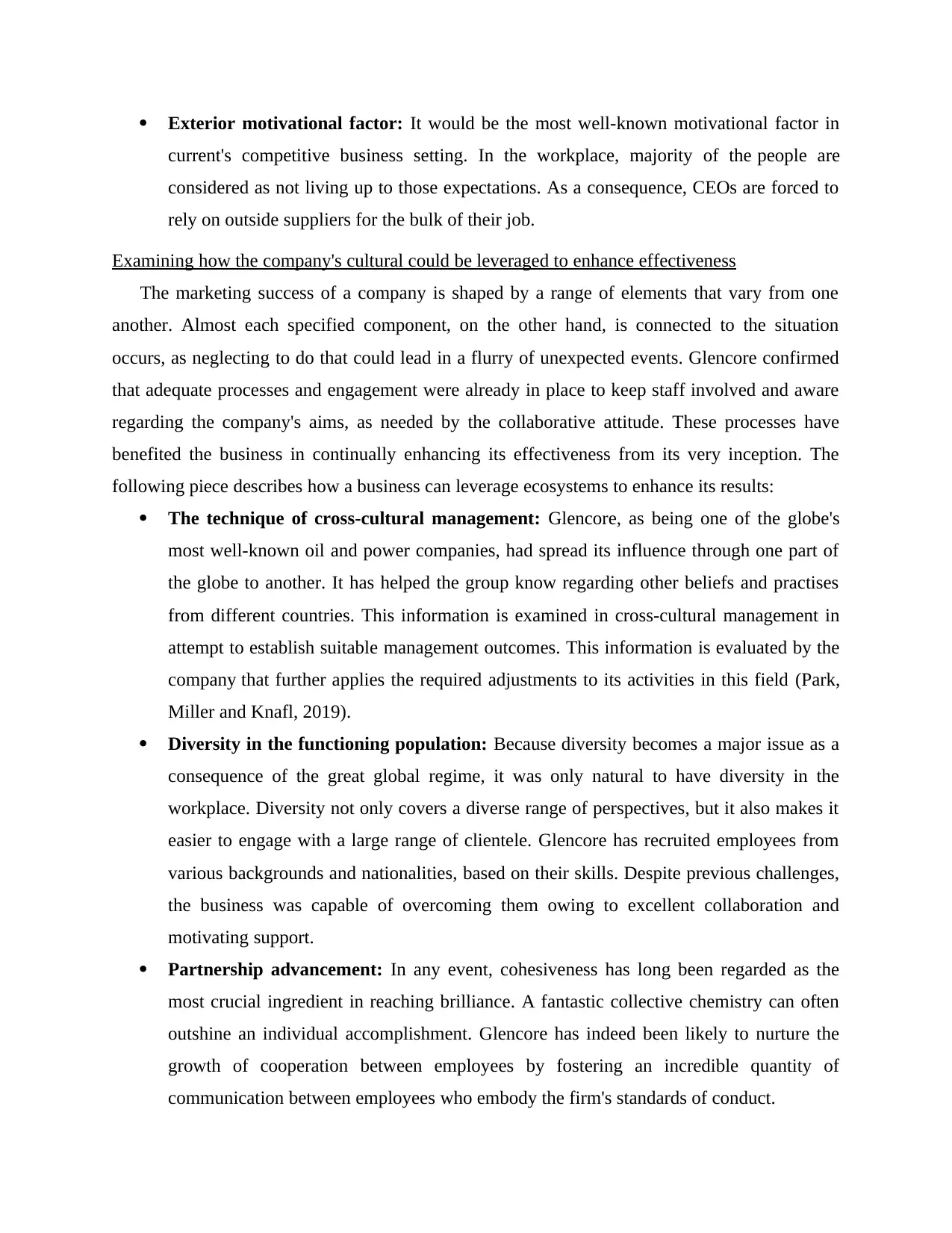
Exterior motivational factor: It would be the most well-known motivational factor in
current's competitive business setting. In the workplace, majority of the people are
considered as not living up to those expectations. As a consequence, CEOs are forced to
rely on outside suppliers for the bulk of their job.
Examining how the company's cultural could be leveraged to enhance effectiveness
The marketing success of a company is shaped by a range of elements that vary from one
another. Almost each specified component, on the other hand, is connected to the situation
occurs, as neglecting to do that could lead in a flurry of unexpected events. Glencore confirmed
that adequate processes and engagement were already in place to keep staff involved and aware
regarding the company's aims, as needed by the collaborative attitude. These processes have
benefited the business in continually enhancing its effectiveness from its very inception. The
following piece describes how a business can leverage ecosystems to enhance its results:
The technique of cross-cultural management: Glencore, as being one of the globe's
most well-known oil and power companies, had spread its influence through one part of
the globe to another. It has helped the group know regarding other beliefs and practises
from different countries. This information is examined in cross-cultural management in
attempt to establish suitable management outcomes. This information is evaluated by the
company that further applies the required adjustments to its activities in this field (Park,
Miller and Knafl, 2019).
Diversity in the functioning population: Because diversity becomes a major issue as a
consequence of the great global regime, it was only natural to have diversity in the
workplace. Diversity not only covers a diverse range of perspectives, but it also makes it
easier to engage with a large range of clientele. Glencore has recruited employees from
various backgrounds and nationalities, based on their skills. Despite previous challenges,
the business was capable of overcoming them owing to excellent collaboration and
motivating support.
Partnership advancement: In any event, cohesiveness has long been regarded as the
most crucial ingredient in reaching brilliance. A fantastic collective chemistry can often
outshine an individual accomplishment. Glencore has indeed been likely to nurture the
growth of cooperation between employees by fostering an incredible quantity of
communication between employees who embody the firm's standards of conduct.
current's competitive business setting. In the workplace, majority of the people are
considered as not living up to those expectations. As a consequence, CEOs are forced to
rely on outside suppliers for the bulk of their job.
Examining how the company's cultural could be leveraged to enhance effectiveness
The marketing success of a company is shaped by a range of elements that vary from one
another. Almost each specified component, on the other hand, is connected to the situation
occurs, as neglecting to do that could lead in a flurry of unexpected events. Glencore confirmed
that adequate processes and engagement were already in place to keep staff involved and aware
regarding the company's aims, as needed by the collaborative attitude. These processes have
benefited the business in continually enhancing its effectiveness from its very inception. The
following piece describes how a business can leverage ecosystems to enhance its results:
The technique of cross-cultural management: Glencore, as being one of the globe's
most well-known oil and power companies, had spread its influence through one part of
the globe to another. It has helped the group know regarding other beliefs and practises
from different countries. This information is examined in cross-cultural management in
attempt to establish suitable management outcomes. This information is evaluated by the
company that further applies the required adjustments to its activities in this field (Park,
Miller and Knafl, 2019).
Diversity in the functioning population: Because diversity becomes a major issue as a
consequence of the great global regime, it was only natural to have diversity in the
workplace. Diversity not only covers a diverse range of perspectives, but it also makes it
easier to engage with a large range of clientele. Glencore has recruited employees from
various backgrounds and nationalities, based on their skills. Despite previous challenges,
the business was capable of overcoming them owing to excellent collaboration and
motivating support.
Partnership advancement: In any event, cohesiveness has long been regarded as the
most crucial ingredient in reaching brilliance. A fantastic collective chemistry can often
outshine an individual accomplishment. Glencore has indeed been likely to nurture the
growth of cooperation between employees by fostering an incredible quantity of
communication between employees who embody the firm's standards of conduct.
⊘ This is a preview!⊘
Do you want full access?
Subscribe today to unlock all pages.

Trusted by 1+ million students worldwide
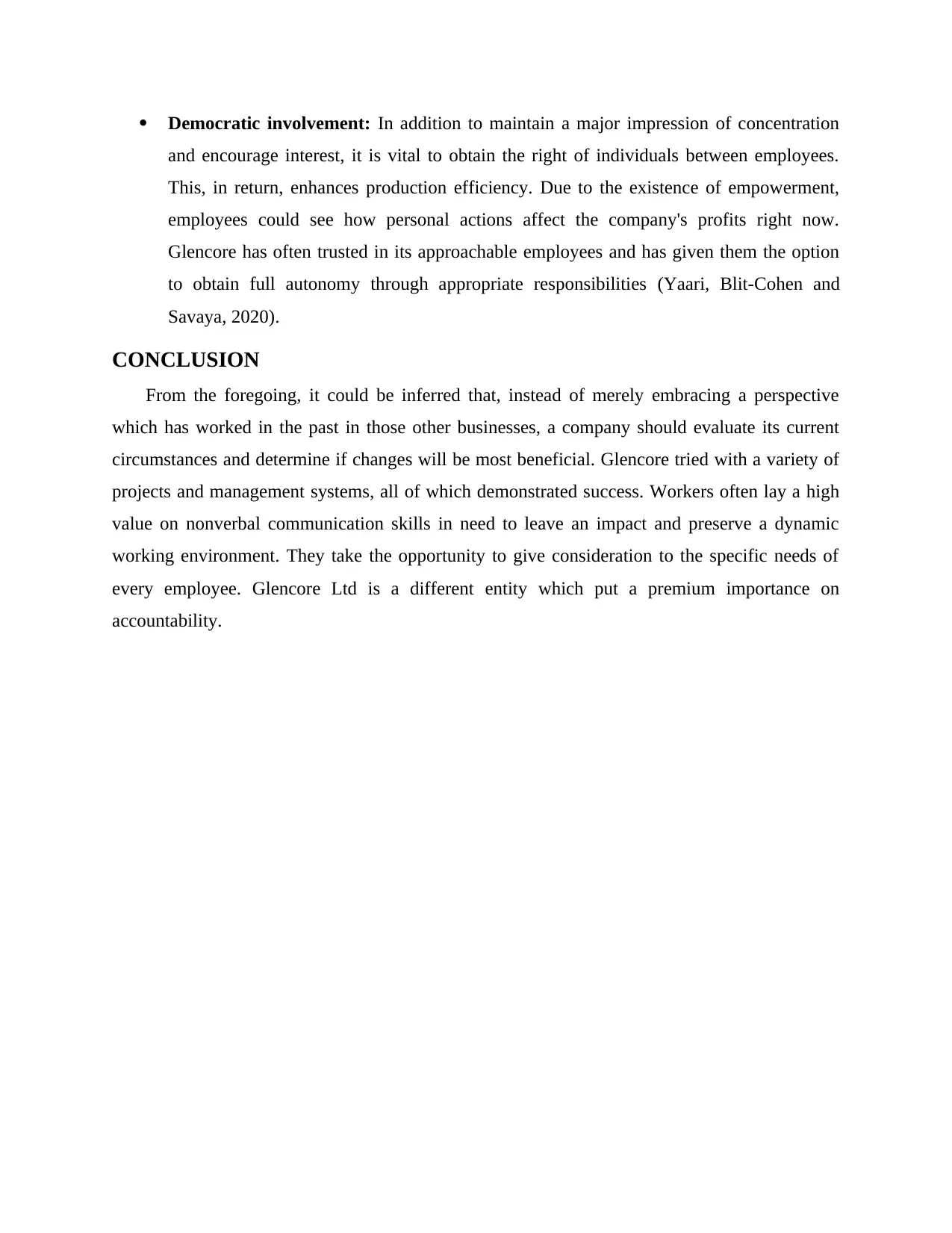
Democratic involvement: In addition to maintain a major impression of concentration
and encourage interest, it is vital to obtain the right of individuals between employees.
This, in return, enhances production efficiency. Due to the existence of empowerment,
employees could see how personal actions affect the company's profits right now.
Glencore has often trusted in its approachable employees and has given them the option
to obtain full autonomy through appropriate responsibilities (Yaari, Blit-Cohen and
Savaya, 2020).
CONCLUSION
From the foregoing, it could be inferred that, instead of merely embracing a perspective
which has worked in the past in those other businesses, a company should evaluate its current
circumstances and determine if changes will be most beneficial. Glencore tried with a variety of
projects and management systems, all of which demonstrated success. Workers often lay a high
value on nonverbal communication skills in need to leave an impact and preserve a dynamic
working environment. They take the opportunity to give consideration to the specific needs of
every employee. Glencore Ltd is a different entity which put a premium importance on
accountability.
and encourage interest, it is vital to obtain the right of individuals between employees.
This, in return, enhances production efficiency. Due to the existence of empowerment,
employees could see how personal actions affect the company's profits right now.
Glencore has often trusted in its approachable employees and has given them the option
to obtain full autonomy through appropriate responsibilities (Yaari, Blit-Cohen and
Savaya, 2020).
CONCLUSION
From the foregoing, it could be inferred that, instead of merely embracing a perspective
which has worked in the past in those other businesses, a company should evaluate its current
circumstances and determine if changes will be most beneficial. Glencore tried with a variety of
projects and management systems, all of which demonstrated success. Workers often lay a high
value on nonverbal communication skills in need to leave an impact and preserve a dynamic
working environment. They take the opportunity to give consideration to the specific needs of
every employee. Glencore Ltd is a different entity which put a premium importance on
accountability.
Paraphrase This Document
Need a fresh take? Get an instant paraphrase of this document with our AI Paraphraser
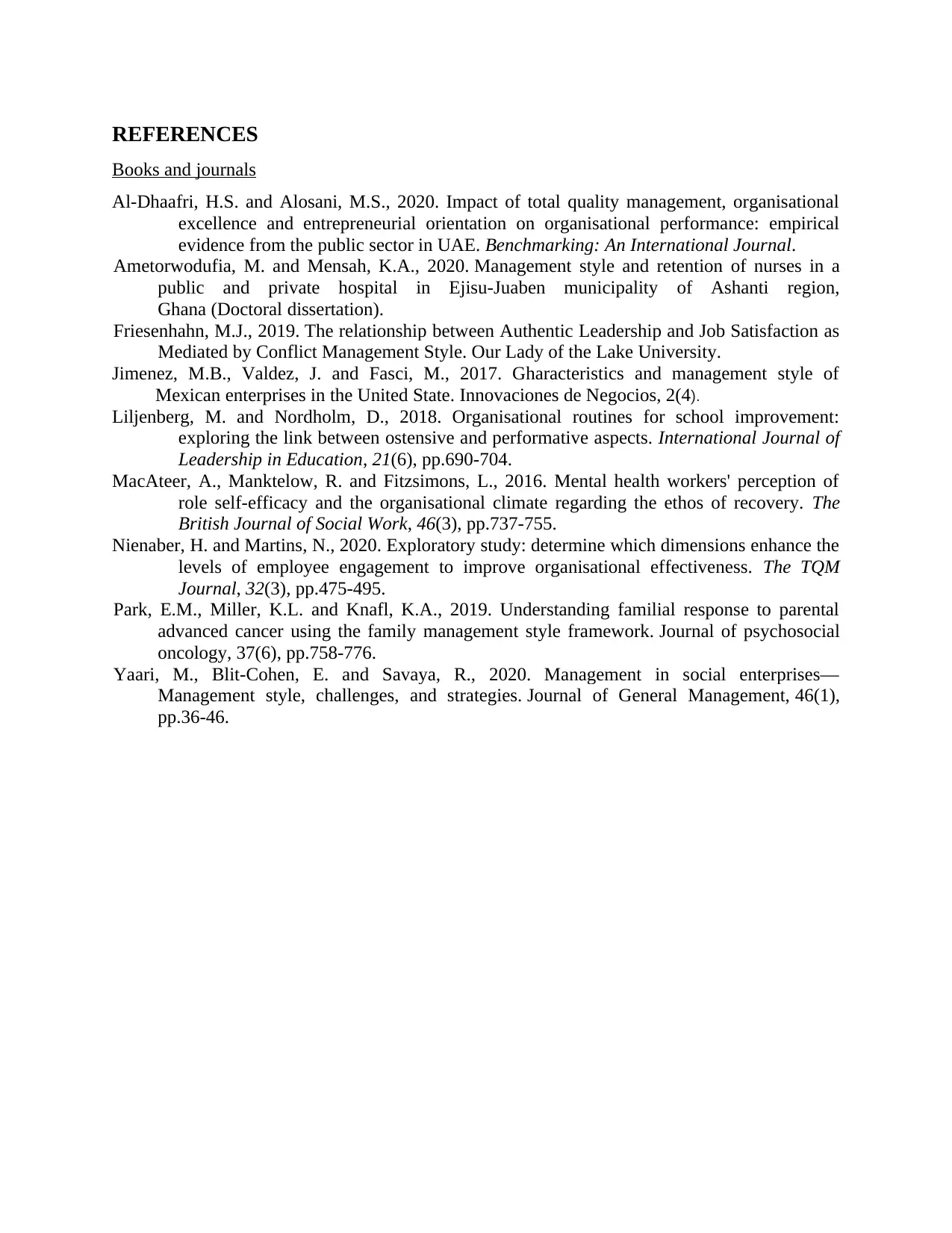
REFERENCES
Books and journals
Al-Dhaafri, H.S. and Alosani, M.S., 2020. Impact of total quality management, organisational
excellence and entrepreneurial orientation on organisational performance: empirical
evidence from the public sector in UAE. Benchmarking: An International Journal.
Ametorwodufia, M. and Mensah, K.A., 2020. Management style and retention of nurses in a
public and private hospital in Ejisu-Juaben municipality of Ashanti region,
Ghana (Doctoral dissertation).
Friesenhahn, M.J., 2019. The relationship between Authentic Leadership and Job Satisfaction as
Mediated by Conflict Management Style. Our Lady of the Lake University.
Jimenez, M.B., Valdez, J. and Fasci, M., 2017. Gharacteristics and management style of
Mexican enterprises in the United State. Innovaciones de Negocios, 2(4).
Liljenberg, M. and Nordholm, D., 2018. Organisational routines for school improvement:
exploring the link between ostensive and performative aspects. International Journal of
Leadership in Education, 21(6), pp.690-704.
MacAteer, A., Manktelow, R. and Fitzsimons, L., 2016. Mental health workers' perception of
role self-efficacy and the organisational climate regarding the ethos of recovery. The
British Journal of Social Work, 46(3), pp.737-755.
Nienaber, H. and Martins, N., 2020. Exploratory study: determine which dimensions enhance the
levels of employee engagement to improve organisational effectiveness. The TQM
Journal, 32(3), pp.475-495.
Park, E.M., Miller, K.L. and Knafl, K.A., 2019. Understanding familial response to parental
advanced cancer using the family management style framework. Journal of psychosocial
oncology, 37(6), pp.758-776.
Yaari, M., Blit-Cohen, E. and Savaya, R., 2020. Management in social enterprises—
Management style, challenges, and strategies. Journal of General Management, 46(1),
pp.36-46.
Books and journals
Al-Dhaafri, H.S. and Alosani, M.S., 2020. Impact of total quality management, organisational
excellence and entrepreneurial orientation on organisational performance: empirical
evidence from the public sector in UAE. Benchmarking: An International Journal.
Ametorwodufia, M. and Mensah, K.A., 2020. Management style and retention of nurses in a
public and private hospital in Ejisu-Juaben municipality of Ashanti region,
Ghana (Doctoral dissertation).
Friesenhahn, M.J., 2019. The relationship between Authentic Leadership and Job Satisfaction as
Mediated by Conflict Management Style. Our Lady of the Lake University.
Jimenez, M.B., Valdez, J. and Fasci, M., 2017. Gharacteristics and management style of
Mexican enterprises in the United State. Innovaciones de Negocios, 2(4).
Liljenberg, M. and Nordholm, D., 2018. Organisational routines for school improvement:
exploring the link between ostensive and performative aspects. International Journal of
Leadership in Education, 21(6), pp.690-704.
MacAteer, A., Manktelow, R. and Fitzsimons, L., 2016. Mental health workers' perception of
role self-efficacy and the organisational climate regarding the ethos of recovery. The
British Journal of Social Work, 46(3), pp.737-755.
Nienaber, H. and Martins, N., 2020. Exploratory study: determine which dimensions enhance the
levels of employee engagement to improve organisational effectiveness. The TQM
Journal, 32(3), pp.475-495.
Park, E.M., Miller, K.L. and Knafl, K.A., 2019. Understanding familial response to parental
advanced cancer using the family management style framework. Journal of psychosocial
oncology, 37(6), pp.758-776.
Yaari, M., Blit-Cohen, E. and Savaya, R., 2020. Management in social enterprises—
Management style, challenges, and strategies. Journal of General Management, 46(1),
pp.36-46.
1 out of 11
Related Documents
Your All-in-One AI-Powered Toolkit for Academic Success.
+13062052269
info@desklib.com
Available 24*7 on WhatsApp / Email
![[object Object]](/_next/static/media/star-bottom.7253800d.svg)
Unlock your academic potential
Copyright © 2020–2025 A2Z Services. All Rights Reserved. Developed and managed by ZUCOL.



